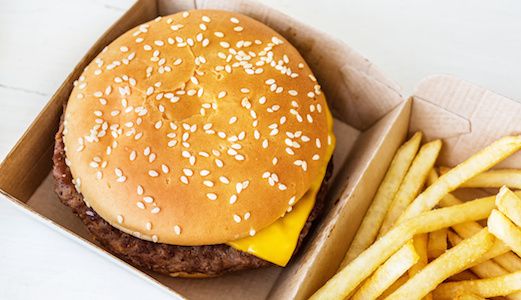Dangerous Chemicals Lurk in Fast Food Packaging
Some fast food packaging may contain harsh chemicals.

Loyal fast food fans might want to rethink ordering that inexpensive meal on the go.
While fast foods have long been scrutinized for their elevated levels of cholesterol, fat, and sodium, new research has highlighted another potential threat: chemicals linked to cancer in fast food packaging.
Laurel Schaider, PhD, of Silent Spring Institute in Newton, Massachusetts, and colleagues conducted a study evaluating wrappers from 27 fast food companies including McDonald’s, Panera Bread, Starbucks, and Wendy’s. The team discovered that one-third of the samples contained concentrations of fluorine — a chemical marker for the per-and polyfluoroalkyl substances (PFAS).
Some of the commonly studied PFAS — PFOSs and PFOAs – have shown changes in hormone levels, liver, pancreatic function, and thyroid. The Centers for Disease Control and Prevention (CDC)’s Agency for Toxic Substances and Disease Registry released a report that outlined some of the PFAS harmful effects:
- Could affect the developing fetus and child, including possible changes in growth, learning, and behavior
- Decrease fertility and interfere with the body’s natural hormones
- Increase cholesterol
- Affect the immune system
- Increase cancer risk
PFAS are typically used in nonstick, stain-resistant, and waterproof products. In fast food packaging, PFAS are used in sandwich and dessert wrappers and paperboard containers (containers for French fries or pizza) to keep grease and sauces from leaking through the wrapper. However, paper cups for drinks were in the clear.
While it was difficult for the researchers to assess exactly what level of chemical PFAS traveled into the food, they suspected the transfer was higher in foods that were hot or contained emulsified fats like mayonnaise.
“PFAS are considered emerging contaminants,” The US Environmental Protection Agency (EPA) explained in a published interim guidance. PFAS are not only resistant to environmental degradation, but also pose severe effects for health including kidney and testicular cancer and immunotoxicity in children.
Despite their findings, the team stressed further studies with larger cohorts are needed before finalizing a causal relationship between PFAS in fast food wrappers, cancer risk, and other severe health care concerns. In the mean time, the study team suggests consumers pressed for time should remove their food from the packaging sooner rather than later.